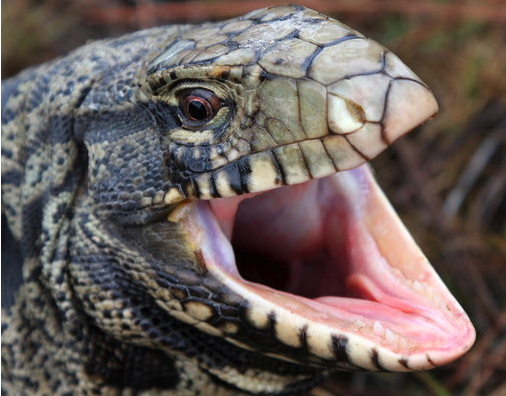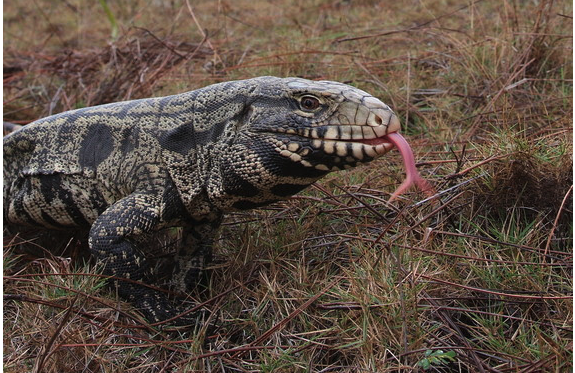2020 has thrown a lot of weird, wild and ugly at us.
Right now, there are currently two tropical storms/ hurricanes aimed to hit the Gulf coast around the same time, wildfires raging in the west, all the while a global pandemic still lingers.
What else could possibly go wrong?
On Friday, the South Carolina Department of Natural Resources (SCDNR) announced that a non–native lizard was officially spotted in Lexington, S.C.
It was the first time the black and white tegu lizard has been officially documented in the Palmetto State.
These “voracious” lizards, popular in the pet trade, can grow up to 4 feet long and weigh up to 10 pounds, according to SCDNR.
Yikes.
“SCDNR staff have been monitoring the situation closely and have received multiple reports since May from Lexington and Aiken counties,” SCDNR said Friday.
However, only one of the reports was a confirmed sighting of the tegu lizard.
“The introduction of any non-native species can have serious negative impacts on native wildlife. Black and white tegus are no exception,” said SCDNR herpetologist Andrew Grosse, “Tegus mature and reproduce quickly, though most concerning may be their preference for eggs and the potential impacts to our native ground-nesting birds like turkey and quail, as well as other species such as the state-endangered gopher tortoise.”
Tegus eat a “variety of prey” including “birds, small mammals, reptiles and amphibians, fruits, vegetables, insects, and eggs,” the report said.

They are fast-moving and strong swimmers, according to Georgia DNR. They live up to about 20 years and “can multiply quickly.”
Tegus began invading Georgia in 2018, according to Georgia DNR. Officials believe this started with captive pets getting loose in the wild in Toombs and Tattnall counties.
The good news is that according to Georgia DNR, tegus are not a threat to dogs and cats.
Phew.
“Florida’s wildlife agency—which has been dealing with tegus much longer than Georgia DNR—is not aware of any predatory attacks on pets in that state,” Georgia DNR officials said. “However, DNR advises against leaving pet food outdoors: It can attract tegus and other wildlife to your yard.”

In SC, if you spot a tegu lizard dead or alive, take a photo immediately and contact Andrew Grosse, grossea@dnr.sc.gov.
***
WANNA SOUND OFF?
Got something you’d like to say in response to one of our articles? Or an issue you’d like to address proactively? We have an open microphone policy! Submit your letter to the editor (or guest column) via email HERE. Got a tip for a story? CLICK HERE. Got a technical question or a glitch to report? CLICK HERE.
